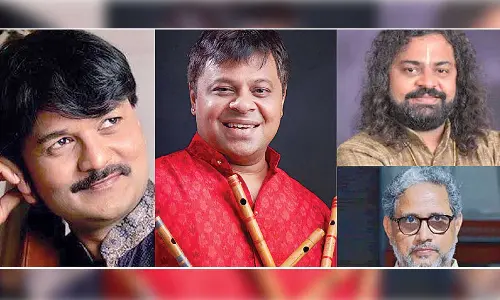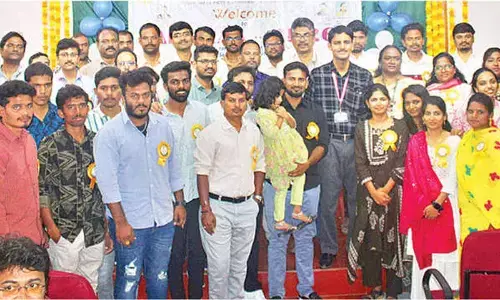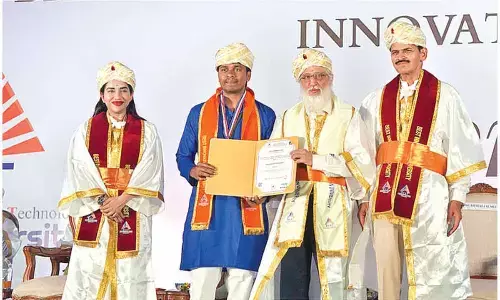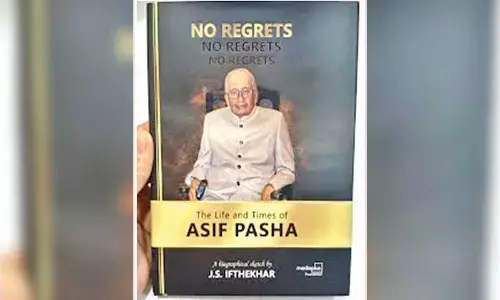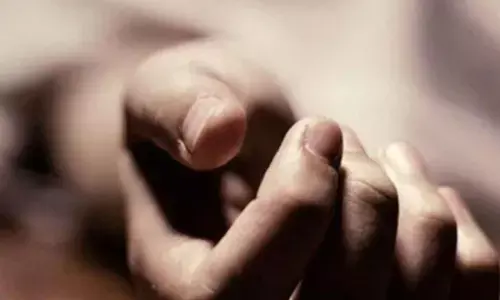Education is no longer a service, it is an industry: IGNOU

Representational image
With education becoming an industry the teaching which was considered to be a mission, has now become a profession. That is the paradigm shift
With the Union Cabinet clearing the National Education Policy, education has now become an industry. There is going to be a paradigm shift from quantity to quality. "NEP 2020 is going to change the landscape of Indian education drastically and will transform it from being a service sector to industry said Dr K Ramesh, Regional Director, IGNOU Hyderabad, in an exclusive interview The Hans India.
Dr Ramesh said IGNOU, the World's largest open university, has seen record number of enrolments since the outbreak of pandemic. He said NEP will not only support students of the coming generations but also help teachers with Professional Standards of Education which would deal with their service matters, training abilities and their upgradation skills of the use of technology. The policy has given equal weightage to all the streams of education and not just social sciences, he said.
Explaining the policy highlights, Dr Ramesh said NEP, 2020 holds multiple new options such as Dual-Degree, Technical Education and Skill Training. But then how would it cater to the streams of education like pharmaceuticals or engineering? Such doubts are there among the students.
Recalling the recommendations of the past commissions that were appointed by successive governments right from 1948 headed by Sarvepalli Radhakrishnan, the Mudaliar commission 1953, Kothari Commission 1964 and the Education Policy 1986, he said they emphasised on quantity while NEP talks of quality.
The NEP 2020 has brought such a global pace where we will be able to compete with those countries which are industrially advanced."
The IGNOU Hyderabad Regional Director allayed fears that NEP 2020 would put additional pressure on students. He said that NEP 2020 on the other hand will help serious learners, those who want to develop professionalism and build a "serious career.
"Initially we may feel that pursuing dual-degrees is burdensome but the second degree or course which the learners are choosing is allied with their field and will fetch them better opportunities to enter into the (job) market. So, I don't subscribe to the idea that students are afraid of the dual degree. Moreover, it is not compulsory. They can be taken up if one wants to progress faster in life," he said.
Dr Ramesh also said that over the years, vocational training and open school learning has picked up popularity amongst learners due to the sudden shift towards long-distance education. Institutions like IGNOU have already incorporated the salient features of the NEP, he said.
The Government of India has given one project to develop an awareness programme across the 15-lakh teaching community of India… We are moving from Open and Distance learning to Open and Online learning. In the years to come, we are going to emerge as a virtual university," Dr Ramesh added.
IGNOU, he said was bracing for multiple activities such as outreach programs and has entered into an agreement with the Ministry of Skill Development & Entrepreneurship where the institute has developed a programme namely B.A in Vocational Skills. The institute has already received the MoU with ITI players, Pradhan Mantri Kaushal Kendra (PMKKs), and Jan Shikshan Sansthan (JSS) from all over the country to open work centres in collaboration with IGNOUs.
He said IGNOU already had provisions of pursuing a certificate course while being enrolled in a full-time course. They also introduced the Choice Based Credit System and developed 34 learning programmes online and launched 60 to 70 new programmes and popularised academic courses via social media. IGNOU is also holding academic counselling sessions through Facebook Live and YouTube Channels. With education becoming an industry the teaching which was considered to be a mission, has now become a profession. That is the paradigm shift," Dr Ramesh explained.








